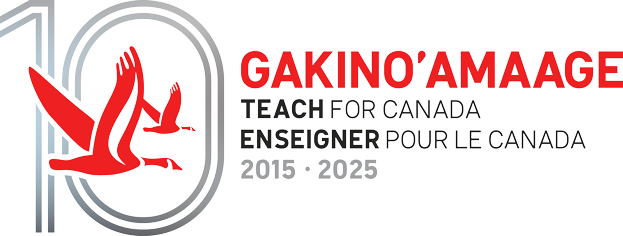Earlier this year, at our Education Assistant Professional Development Program Learning Summit, we had the opportunity to speak with Janice Denechezhe and Linda Inglis about the significance of Culture Week at Petit Casimir Memorial School in Northlands Denesuline First Nation.
Janice, an Education Assistant (EA) participating in the EA Program, and Linda, Vice Principal of Petit Casimir Memorial School, shared their insights on how this celebration strengthens language, tradition, and connection within their school and community. Their stories offer a glimpse into the meaningful work happening in Northlands Dene and the important role educators play in passing down traditions.
This week, the halls and grounds of Petit Casimir Memorial School are filled with the sounds of drumming, the scent of bannock baking, and the shared knowledge of Elders and Knowledge Keepers. Culture Week is a time for the students and community members of Northlands Dene to gather, learn, and celebrate the traditions that shape their identity. Happening four times throughout the year, this week-long event strengthens their connection to the land, their language, and to one another.

A bulletin board filled with TthaNárɛltth’ɛr artwork created by students.
For Janice Denechezhe, an Education Assistant at the school, Culture Week is more than an event—it is a continuation of the teachings that have been passed down through generations. Originally stepping into the role of EA temporarily in 2021, she found herself drawn to the work through the encouragement of family and the inspiration of her cousin, whose dedication to earning her teaching certification deeply motivated her. “Everyone is pushing me to be a teacher. They see how hardworking I am. That gives me confidence,” she shares.
This week, Janice is eager to bring land-based learning into her classroom. “Beadwork is a big part of our culture,” she explains. “Some of our younger boys hunt with their dads and uncles. They know how to cut caribou and scale fish.” By incorporating these experiences into the classroom, the school helps students grow up with the knowledge and skills that have sustained Northlands Dene for generations.
Vice Principal Linda Inglis speaks to the importance of Culture Week in upholding the school’s vision of strengthening language and tradition. The week begins with an assembly honouring TthaNárɛltth’ɛr, a revered Dene hero. “We’ve invited guest speakers, traditional drummers, and Elders to share stories about how they remember her,” Linda explains. In the Dene language classroom, Elders will tell stories and share legends, ensuring that our oral traditions remain strong.

An Elder shares a story with students gathered around, keeping them engaged with her words.
Students are also taking part in home economics activities, preparing caribou meat and baking bannock. Thanks to a recent community-led caribou hunt, the school has a generous supply of meat that will last through the spring. Cranberries and blueberries, harvested during the summer, will be used to make traditional jams. Local artists will guide students in beading and crafting red felt dresses in honour of TthaNárɛltth’ɛr, known for her iconic red coat.
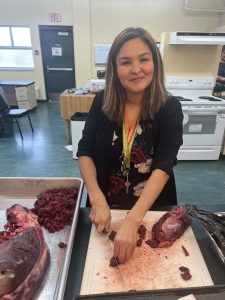
Education Assistant Lisa O’tennedzhe cuts caribou meat, preparing it for smoking so students can take some home during Culture Week.
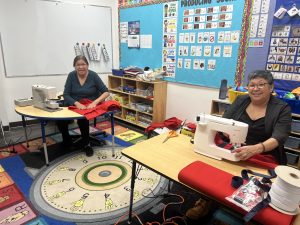
Staff sew red felt dresses, a tribute to TthaNárɛltth’ɛr, the revered Dene hero known for her iconic red coat.
Throughout the week, students of all ages will engage in activities that highlight Dene culture and identity. High school students are writing poems inspired by traditional stories, and the week will close with a grand feast featuring traditional foods, drumming, hand games, and a dance giveaway. “It’s a way for our whole community to come together,” Linda says. “Parents, Elders, leadership—everyone is welcome.”
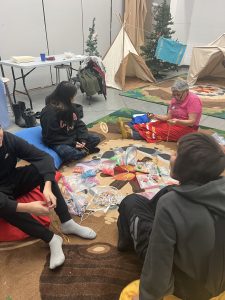
An Elder sits with students, guiding them through a craft project.
Perhaps the most powerful aspect of Culture Week is the way it strengthens connections to each other and traditions. “It’s important that our students know and learn this,” Linda says. “It’s in their blood, and it’s in our school vision. Culture and language are our top priorities.”
As the week concludes, students will take home not only dried meat and crafts but also a deeper understanding of who they are and where they come from. For educators like Janice, the experience is a reminder of the power of teaching—and the pull of tradition. “Passing down our traditions and language is very important to me,” she says. “I speak Dene to my son and hope that he learns it fluently.”
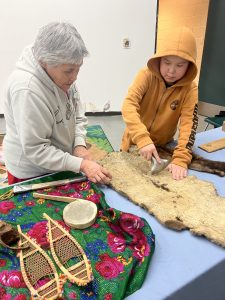
An Elder helps a student prepare hides.
Culture Week is a reflection of the deep cultural roots and enduring traditions of Northlands Dene. As students, educators, and community members gather, listen to the stories of Elders, and take part in traditional activities, they strengthen the cultural fabric that connects past, present, and future.
Interested in growing your skills as a First Nations Education Assistant? The Education Assistant Program offers professional development and peer support for EAs in the First Nations we serve. Learn more and get involved.


